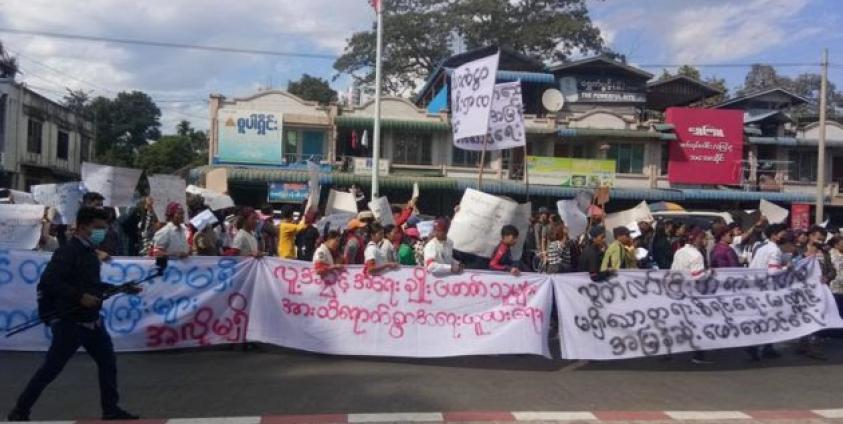The Karen Peace Support Network put out a statement condemning the conviction and jailing of three Kachin peace activists claiming the action is designed to silence the criticism of Myanmar’s military and its abuses.
The three Kachin activists, Lum Zawng, Nang Pu and Zau Jat were involved in protests to demand the military allow trapped civilians safe passage from the conflict zone and end airstrikes on civilian areas.
On December 7, the three were convicted for defaming the Tatmadaw under section 500 of the Penal Code. Each activist was sentenced to six months imprisonment and fined approximately US$320 each.
On 30 April 2018, over 3,000 people demonstrated peacefully in response to ongoing conflict between the Tatmadaw and Kachin Independence Army. According to Amnesty International, escalating violence in April displaced over 5,000 civilians, 2,000 of whom were trapped in a forest near Tanai for weeks without humanitarian support.
On December 9, the KPSN joined prominent international human rights groups like Amnesty International and Human Rights Watch in condemning the conviction and jailing of these three activists. Their statement argues ‘the jailing of these activists is designed to silence criticism of the military,’ but reiterates KPSN’s firm belief that it will not succeed in suppressing the voices of Burma’s ethnic minorities. ‘Ethnic people will stand united for our rights, for peace, and for our freedom.’
KPSN demanded that the NLD use its constitutional power to immediately release all political prisoners and repeal section 500 of the Penal Code, which criminalises defamation.
Human Rights Watch has noted such provisions are out of step with international standards, which consider defamation a civil, rather than criminal offence. Activists claim that not only does the NLD have the constitutional power to free these prisoners, but it has a clear majority in the Hluttaw, Burma’s parliament. This means that if it wished to, the NLD could easily repeal section 500 of the Penal Code and other laws used to imprison members of civil society like section 66(d) of the Telecommunications Act.
Right groups in the region have pointed out that the arrests of Lum Zawng, Nang Pu and Zau Jat are the latest in a string of attacks on civil society by the NLD and Tatmadaw. Athan, an organisation monitoring freedom of expression in Burma, claims 44 journalists and 142 activists have been prosecuted since Aung San Suu Kyi’s government came to power in 2016.
Human right advocates claim the jailing of the three Kachin activists could be interpreted as part of a coordinated campaign by Burmese authorities to silence dissent and Amnesty International says it is a clear violation of universal human rights such as the freedoms of expression and assembly.
Arguably, the most prominent recent attack on civil society was the September conviction of Reuters journalists, Wa Lone and Kyaw Soe Oo for violating the Official Secrets Act. Human Rights Watch has repeatedly emphasised the problematic nature of these convictions, including the fact the courts appear to have ignored clear evidence given by a police officer who claimed they framed the two journalists. Human Rights Watch concluded ‘the case shows how little ‘rule of law’… really means in Myanmar.’
Despite the government and military claiming to prioritise peace, arrests like these shows their actions are opposite. The KPSN’s statement argues the fact so many activists remain imprisoned despite the government’s clear power to release them, ‘is yet another example of the lack of genuine goodwill in the peace process.’
The KPSN called on international donors to the peace process to leverage their position to raise the issue of Burma’s imprisonment of ethnic activists and to launch a comprehensive review of their support for the peace process. Some donors like the EU have already begun to do so, with the EU mission to Burma condemning Friday’s convictions. KPSN’s statement concludes that ‘if the military and government were genuine about peace, they would not be jailing peace activists.’







